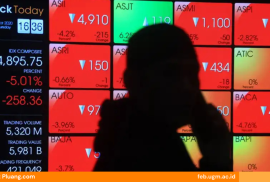On Monday (19/9/) the Faculty Senate held the 2022 Open Senate Meeting as the culmination of a series of events to commemorate the 67th Anniversary of the Faculty of Economics and Business, Universitas Gadjah Mada (FEB UGM). The 2022 Senate Open Meeting was opened by Prof. Ainun Na’im, M.B.A., Ph.D as Chair of the Senate accompanied by the Senate Secretary, Dean, and the ranks of Professors of FEB UGM. The agenda for the event is reporting the Dean’s Speech in 2022, followed by the delivery of Scientific Orations.
At the peak of this 67th Anniversary, a scientific oration was delivered by one of the professors of FEB UGM, namely Prof. Dr. Mamduh M. Hanafi, M.B.A. with the title “Looking for an Explanation of Financial Market Behavior: Rational, Irrational, or Adaptive?” Today, academics are still grappling with the question of what drives investor behavior in financial markets. This scientific oration aims to discuss the literature on market efficiency, behavioral science, and adaptive markets, with various empirical tests.
Based on the explanation of Prof. Mamduh, nowadays there are two main paradigms that try to explain investor behavior, namely investor rationality and investor behavior. The controversy between the two paradigms continues to this day. Meanwhile, this controversy between efficiency versus behavior paved the way for the emergence of an alternative theory, namely the Adaptive Markets Hypothesis (Lo, 2004; Routledge, 1999), which departs from the observation that market efficiency conditions fluctuate. These fluctuating conditions give rise to the idea that the market or investors adapt to their environment.
The assumption of rationality in investor behavior has been the dominant paradigm so far. Behavioral finance tries to destroy this paradigm. However, Behavioral Finance is not without its critics. In accordance with the prevailing scientific tradition, one theory can only be replaced by another theory. In this context, behavioral finance still shows limitations. Currently, it seems that there is no unifying behavioral finance theory (unifying behavioral finance theory).
Meanwhile, the Adaptive Market Hypothesis (AMH) tries to be an alternative theory to explain investor behavior. However, until now, AMH has not been formulated in a rigorous manner, becoming a solid theory, which is ready to replace other theories. Empirical testing of AMH is also still limited, and still focuses on testing the weak form of efficiency, especially testing the randomness of stock price movements. But, with the passage of time, it is not impossible that AMH can become an alternative theory that can better explain investor behavior.
According to Prof. Mamduh, in statistics, a 5% significance level leaves room for other phenomena not explained by a theory. However, with the development of the Behavioral Finance literature and the Adaptive Market Hypothesis, changes are likely to occur. One day, Behavioral Finance or the Adaptive Market Hypothesis might explain 95% of the phenomenon of investor behavior. In the end, time will prove these predictions.
The complete scientific oration manuscript can be accessed via the following link: https://ugm.id/RTS2022
Reportage: Kirana Lalita Pristy




